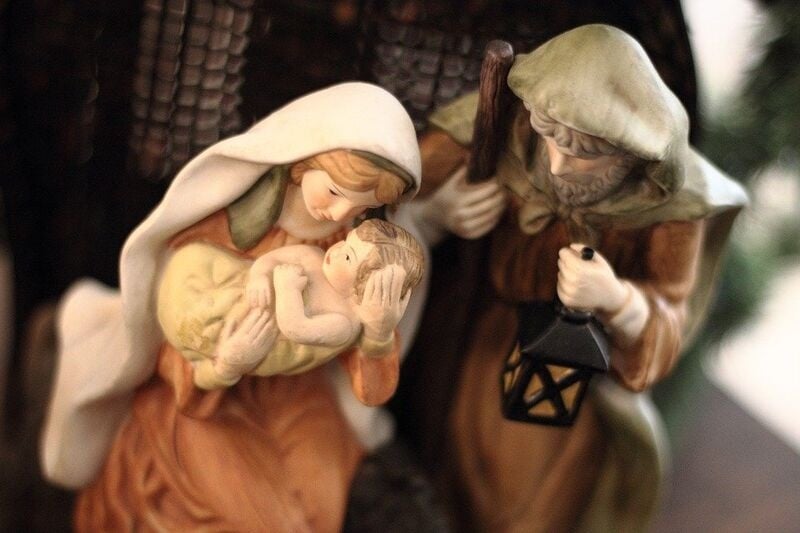When most of us think of the birth of Jesus, we think about Christmas on December 25th. In some parts of the world, Christmas is celebrated on January 6th instead. While traditions of celebrating Christmas on both dates have a long and storied history, modern biblical scholars are reasonably certain these dates are not accurate.
In fact, if there is one thing that biblical scholars and historians do agree on, it’s that Jesus was almost certainly not born in the middle of winter. This leaves us with the questions we are here to explore today: when was Jesus truly born, and how did we end up with Christmas on December 25th? Let’s find out.
 Image by cmac.pt
Image by cmac.pt
Calendric Confusion: Placing Jesus’ Birth in Time
There are two different numbers we're looking for in placing Jesus' Birthday: the birthdate, and the birth year. We’ll get to the birthdate in a moment, but let’s take a moment to investigate the birth year. In exploring this question it’s important to recognize where the calendar concepts of B.C. (“before Christ”) and A.D. (“after death”) originated, and how they shape our understanding of biblical time.
B.C. and A.D. were devised by a monk named Dionysius Exiguus in the 6th century. Dionysius was creating a new Easter table, and in the process, he decided to replace the old way of numbering years with a new one that celebrated the glory of Christ. Using the Roman records and the Julian calendar of the time, Dionysius estimated his present year to be 525 years since the birth of Christ, or 525 A.D.
Dionysius never attempted nor likely even intended to use his new calendar numbering system to ascribe dates to past events or birthdates. It would not be until 200 years later that Saint Bede would bring Dionysius’ Christian Era to the broader world. As we shall see shortly, however, Dionysius was not too far off with his calculations.
What Does the Bible Say?
To narrow down the year of Jesus’ birth, many biblical scholars look to Luke 1:5 and Matthew 2:1, in which Jesus’ birth is said to have happened during the reign of King Herod. The historical narrative says that Herod died during an eclipse, which most (though not all) scholars attribute to a historical eclipse in 4 A.D.
Biblical scholars have yet to agree on exactly when the eclipse during Herod’s death happened. Some scholars argue that it may have been a different eclipse that happened around 1 A.D. If so, this reading of history makes Dionysius’ calculations look a lot more accurate than he gets credit for.
Other scholars look to the Star of Bethlehem as an indicator of Jesus’ birth year. Astronomers have tried to use the Star to get a fix on the birth year by looking at historical plant conjunctions, which is when two planets appear to converge or overlap in the night sky. One common suggestion is that the Star was a conjunction of Venus and Jupiter in June of 2 B.C.
There is no broad census on Christ’s birth year, though 4 A.D. is perhaps the most accepted year. As for His birthdate, the most common verse referenced in the context of Jesus’ actual birth is Luke 2:8: “And there were shepherds living out in the fields nearby, keeping watch over their flocks at night.”
As shepherding is deeply intertwined with the changing seasons, biblical scholars have looked to Luke 2:8 as an indication that it’s unlikely Jesus was born in December, since at that time of year the Shepherds would not have their flocks out in the open cold.
Instead, biblical scholars suggest that Jesus was most likely born between late spring and early fall. One commonly referenced indicator is this is in Luke (2:1-4), which tells of Mary and Joseph registering for the census. This was an undertaking that wouldn’t have been done in winter due to difficulties in travel and turnout.
Unfortunately, neither of these details really tell us exactly what day Jesus was born. Some scholars have made further attempts to answer this persistent question by looking to the birth of John the Baptist, who was said to be six months older than Jesus. Based on these calculations, they believe Jesus was born in the latter half of September.
 Image by unsplash.com
Image by unsplash.com
Where Did December 25th Come From?
Based on the Biblical and historical evidence we have it’s difficult to accurately pin down an exact birth date for Jesus. While we may not know the exact details, we can say with reasonable confidence that Christ was born around or shortly before late September between 4 B.C. and 1 A.D. There is, however, a consensus that Jesus was not born on December 25th or January 6th. This raises the question; how did we end up with traditions that celebrate Christmas in the middle of winter, when the only thing we’re certain about is that Jesus was not born in the winter?
Using historical records, we can trace back December 25th as Jesus’ birthday and the date of Christmas to the 4th century. The most common explanation is that Christians of the time adopted the guise of Pagan winter solstice celebrations, such as the Romans’ Saturnalia, to make the Christian holiday more approachable to Pagans and gain more converts. There are, however, no records of this intention by Christian leaders at the time. In fact, some scholars note that because Christians still faced significant persecution in the 4th century and were not likely to have risked such close contact and potential offense with their persecutors.
Why We Celebrate Christmas
At the end of the day, there are no real clear-cut answers on when Jesus was born. It’s entirely possible, even likely, that to some extent early Christians either adopted or found resonance in Pagan Winter Solstice celebrations, and this time of celebration continues to bring Christians together throughout the world.
As time went on and Christianity evolved, the meaning and Christmas continued to evolve as well. So while we may not have all the clear answers we seek in this life, we have yet a wealth of shared culture and history that brings meaning and richness to our lives.




















































